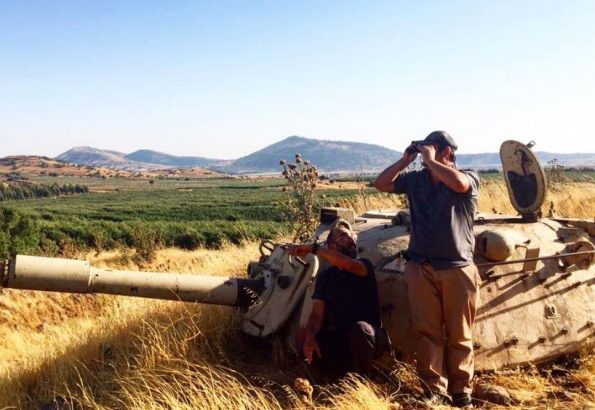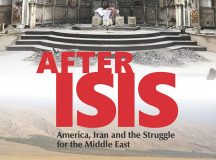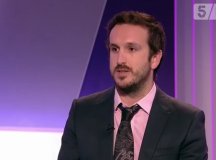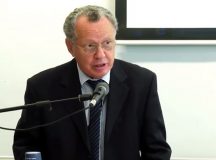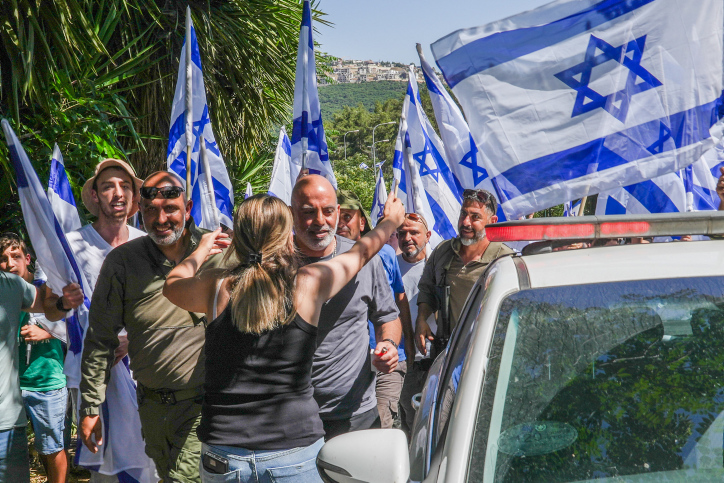Seth Frantzman’s new book, After ISIS: America, Iran and the Struggle for the Middle East, based on his extensive travels in the region’s war-zones, tells the story of how the war against ISIS was won but the peace was lost. ‘80 countries signed on to stop terrorism’ he tells Fathom, ‘but they neglected to consider the fallout’. Once again then, tactical success has been combined with strategic failure in the region. Frantzman spoke to Fathom deputy editor Sam Nurding in late 2019.
Origins of the Book
Sam Nurding: What made you want to write a book on ISIS, and in what ways it is different to the existing literature?
Seth Frantzman: I started to cover the conflict against ISIS very soon after it started in 2014. I remember watching those brutal videos throughout June and August 2014 of executions and murders, originally of Shi’ites and then Yazidis. I felt it was very important to cover what was happening and track the consequences. In 2015, I got the chance to fly to Iraq, and I have continued to travel to Iraq, Turkey, Jordan and other countries in the region ever since.
When I first visited northern Iraq, in 2014, ISIS was threatening the Kurdish region. When I returned in December 2015 mass graves of Yazidi victims had been liberated. I then went on to visit several other areas that had been liberated. I thought this would be similar to going into Europe after starting in Normandy and seeing the liberation of the continent piece by piece. But I wanted to write a book that was about not only the liberation, but also about what came next. That’s why the book is titled After ISIS, and that’s why it says at the beginning that this is not a book about extremism, jihadism or Islamism or a history of ISIS or al-Qaeda. Rather, I focus on how these forces were defeated and what came next.
And what I found really shocked me. The Yazidis and other refugees were hoping to return to liberated communities, but when I returned to northern Iraq in 2017 those people were still not returning to their homes. At this point, I realised that it was similar to 1945 when one conflict ended only for another war to start – the Cold War. I believe the conflict against ISIS was a turning point in the region. We saw decline of US power and subsequent rise of Russia, Iran and Turkey. This geo-political moment, I believe, is going to affect the region for the rest of the century. I wanted to sum up the whole experience in a single integrated volume rather than a thousand short articles.
The book is not about extremism. When I was a young boy I enjoyed reading books about the world wars, but I was not particularly interested in the origins of the Nazi ideology. Does it really matter that much? At the end of the day, the Nazis had to be defeated. Sometimes I think we miss the forest for the trees when dealing with what terror/jihadist organisations believe. It is like the KKK in the US: it is easy to disagree with their views, but do I really have to debate those people? Instead, I wanted to focus on the forces fighting the war against ISIS and the manner in which ISIS was being beaten. I also wanted to write about how those forces allied against ISIS are all now fighting each other.
Challenges
SN: What challenges did you face when researching the book? You must have had some hairy moments?
SF: Well, it was complicated being in some of these places, given I am an American with Israeli connections. With those markers, it is not straightforward to be in Iraq or even Turkey at any time; especially the latter, which has become much more hostile to foreign media.
In terms of the conflict itself I did have some concerns about Iranian penetration into Iraq and whether or not Iranian Shi’ite or sectarian militias could be problematic, so I tried to avoid the areas in which those actors were operating. In Turkey I was stopped once by the army when I was reporting on refugees and they did not want journalists to approach certain sites. I always asked myself: what am I going to run into here? Is this an area I shouldn’t go to? When I went to northern Iraq I went to areas controlled by Kurdish forces; when I went to Mosul I went in with a fixer and the Iraqi federal police. I tried to stay with people I trusted, and never wandered off on my own: I would not even think about doing that.
How the war was won but the peace was lost
SN: Your initial focus in the book is how ISIS was defeated. Can we talk about the role of the West and, in particular, how you interpret the role of US in the defeat of ISIS? Will it be viewed as a success?
SF: From a military point of view we have to talk first about the coalition that defeated ISIS. It involved more than 80 countries, which is the largest international coalition ever assembled. That was a big success, and the groundwork for that was laid by the Obama administration. The fight against ISIS was led primarily by local forces, and the US acknowledged that early on. Unlike 2001 in Afghanistan or 2003 in Iraq, the US said, ‘We’re not going to do this for you, you must do the work’. That meant the Kurdish forces in Syria, the Iraqi Army and the Kurdish Peshmerga in Iraq, whilst the US and UK special forces provided most of the training, the equipment, the Humvees, intelligence, drones and airstrikes. Some of these provisions were, of course, necessary to winning certain battles, but none were sufficient to win the important battles – they required ground forces. You can’t win a battle like Stalingrad from the air, and the fighting in Mosul and Raqqa was akin to something like Stalingrad but on a much smaller scale.
It is also important to recognise Iran played a role in defeating ISIS as well, they were part of the militias in Iraq who took heavy casualties defeating ISIS, whilst Turkey also played a minor role but were involved to a lesser extent. Further, the Russians helped liberate places like Palmyra; so, whilst those states are not US allies, they played a role.
The fight against ISIS was very successful tactically, but was not a success on a strategic level. Yes, these forces were able to defeat ISIS, but no-one thought about the day after ISIS. For instance, not one member of the 80-strong coalition bothered to put resources into finding the victims of ISIS: there are still 3,000 unknown victims of ISIS that no one has bothered to help. There are hundreds of thousands of Yazidis still in IDP camps in northern Iraq and no one is helping them return to their homes. On the ground there is no willingness to do anything with civilians in eastern Syria. The fact that the US has also allowed Turkey, a NATO ally, to attack northeast Syria and its own Syrian Defence Forces (SDF) partners, is insane: never before has a country allowed an ally to attack another of its allies.
From a strategic point of view, ask yourself: ‘What the hell was accomplished?’ 80 countries signed on to stop terrorism, but they neglected to consider the fallout, and I think strategically, from a post-war point of view, that’s a massive (and repeated) failure. In the anti-ISIS conflict the US had a problematic strategy but very effective tactics, whereas in other conflicts, like Vietnam, the US possessed a good strategy but poor tactics.
SN: We recently published an interview with Michael Doran, and he argued that the US does actually have a strategy and that strategy now puts the building of alliances with friendly regional states at the centre of foreign policy. What do you say to that?
SF: I would say I am on the other end of the spectrum: you have to prioritise people over states. I understand that in Henry Kissinger’s ‘realist’ world we have to look at the world in the same way one looks at a game of Risk, but having been with displaced persons and refugees you have to ask: How does this strategy affect the people involved? Many states are not great in terms of what impact they are having on the ground. Iraq is, quote unquote, a ‘country’ or ‘state’, but what is actually happening in Iraq? You’ve seen the Iraqi regime killing over 500 protestors in the last three months and it is the same with Lebanon, Syria or Yemen. These are not countries anymore. Take Turkey: Turkey is an ally, but what does Turkey really offer the US vis-à-vis being an ally? Many of the Europeans who joined ISIS were able to get to Syria through Turkey; if Turkey was an ally why did it not close the border? I think we need to go beyond the antiquated realist interpretation of world affairs and now ask: ‘Why did 5,000 Europeans join ISIS, some of whom were converts’? For instance, the (white) woman from Ireland: Ireland is a modern, Western state, but why are their jihadists in Ireland? Jihad is not a problem that is limited to sovereign states: it is a state of mind. Similarly, why did tens of thousands of people in Holland and Belgium join the SS during the Second World War?
Turkey: wilfully blind?
SN: What role did Turkey play in the rise of ISIS and what do you make of the ‘wilful blindness’ allegation typically addressed at Turkey?
SF: Turkey’s main interest was in fighting the PKK from 2015, whereas some say Turkey’s only goal was fighting the PKK. Yes, Turkey is sympathetic to Syrian rebels (and the Muslim Brotherhood in the region), but it turned a blind eye to the fact that extremists were crossing its border who had no interest in the legitimate rebellion. Turkey either didn’t understand that, or perhaps just did not care. Unfortunately, that naivety fuelled this extremism. It seemed like Turkey did not care about potential ISIS terror attacks, until they occurred in Turkey and then President Erdogan began detaining extremists. But I do not think Turkey ever internalised how bad the ISIS threat was, especially to them. Europe is part of the same problem: allowing 5,000 people to leave, some of whom then came back, was also not positive. In this sense, Turkey’s role is part of a much larger problem.
Turkey’s priority was never fighting ISIS. That’s sad for people in Syria and Iraq, but from Turkey’s point of view this position makes perfect sense: ISIS was not the main threat to Turkey.
SN: What did you mean by: ‘we need to understand the post-ISIS Middle East by first understanding Ankara/Istanbul?’
SF: I think you can argue that the cause of most of the conflicts in the Middle East in the last 100 years can be traced back to the fall of the Ottoman Empire. Looking at the region from the perspective of the Ottoman Empire helps us to understand Turkey and Iran as new middle powers in the region, as well as grasping the relationship Turkey has with Russia, which is very complex. In many ways, the US is a far more recent addition to the regional landscape. To understand where we are now, we need to understand the rise and fall of the Arab monarchies and states, because a key context of the rise of ISIS was the crumbling of the Arab regimes. Syria and Iraq used to have very powerful regimes, but are now very weak. The peripheral regimes like Turkey and Iran are now the influential players, as once were the Ottomans and Persians.
Iran: main beneficiary?
SN: You claim that ‘Tehran was the major beneficiary of the chaos left behind by the Sunni extremists’. In what ways has Iran benefitted? Do you think this was inevitable, or could the West have prevented Iran?
SF: Iran looks at the region in a long-term way. It saw US power declining and it wanted to insert itself into Iraq, Lebanon, Yemen and Syria. The Sunni extremism that emerged from the civil war in Afghanistan and other places took hold in the region after 9/11 when Iran started taking control of those countries. Primarily, groups like Al-Qaeda and ISIS worship killing, nothing else. Iran is a much more sophisticated entity and was able to benefit from the chaos in the region. Iran wants the extremists in Iraq, who are a threat to the way it wants to run the country, out; it wants to see the Assad regime back in complete control over Syria, which will safeguard the gains Iran and its proxies have made in the civil war; it wants to run the southern part of Lebanon to threaten Israel; and it would like to get the Americans out of Afghanistan.
Wherever Iran goes it always co-opts part of the local state – whereas the Sunni extremists are concerned with destroying states and killing their civilians. Iran, when co-opting these states, is never very concerned with rebuilding these states’ capacities. That’s why at the moment, for instance, Lebanon is a weak country, post-civil war Syria will remain relatively weak and the chaos in Iraq, interestingly, remains a reflection of what Iran has failed to accomplish. In southern Iraq, which is the Shi’ite part of the country, where is Iranian investment? Why did Iran not turn this area of Iraq into an area that looks like Iran? In this sense, there’s little evidence to suggest Iran’s role has been beneficial.
SN: Could the West have employed an effective counter-strategy to rollback Iranian influence?
SF: I am not sure, because it does not look like the West is too concerned with strategy anymore. If you really want to counter Iran, I do not think that giving more money to countries like Lebanon really works – all this does is give more money to Iran. Iran co-opts these countries and then leeches off them for capital. Now, you could pay a bunch of proxies to fight Iran or arm your own militias, but then what you end up doing is creating a similar situation like Afghanistan, by supporting other jihadist and extremist groups to fight Iranian militias. Maybe the only way for the West to counter Iran is to work with some of the allies it does have, like the Kurdish forces. Turkey is no longer a suitable balance to Iran because it appears to be allying itself more and more closely to Russia, who support the Syrian regime and Iran. It is unclear how it can be balanced. Even the Gulf regimes do not balance Iran. Of course, they do not like Iran, but they do not seem to want to do anything about Iranian aggression. So it is not entirely clear what the best strategy is: Iran has a lot of cards in its deck while its adversaries have used most of their cards.
SN: What do you think will be the consequences for the fight against ISIS and the reconstruction of the liberated areas, of the US assassination of Soleimani?
SF: Soleimani played a key role in the early years of the fight against ISIS in both Iraq and Syria. He helped advise the Iraqi government and helped in knitting together the Shi’ite militias and also encouraging initial support for the Kurdistan region in 2014.
By 2019 with the war against ISIS largely over Soleimani’s role shifted to growing Iran’s influence in Iraq and Syria. His death therefore doesn’t have much of an impact on the overall ISIS issue. It affects more Iran’s overall role in Iraq and Syria and connections with Hezbollah.

